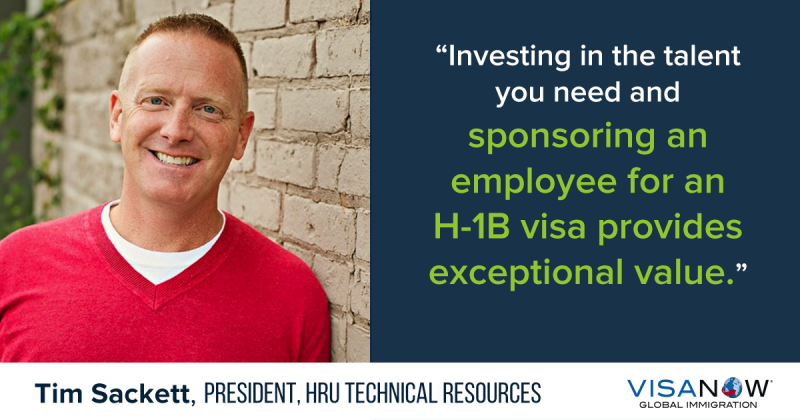Each week, as part of Envoy’s Global Talent Adviser guest blog series, HR influencers will weigh in on topics of global talent and workforce management and planning. This week, we welcome Tim Sackett, president of HRU Technical Resources.
One of employers’ biggest misconceptions about hiring a candidate who needs visa sponsorship is that the process is really expensive. The conversation in HR often goes like this: “I mean, the government charges fees. Then you have to pay the immigration lawyers. Factor in the time it takes your own internal team, and it’s just too expensive. We will not hire H-1Bs.” This is what we tell ourselves.
Each year, the U.S. government issues 85,000 H-1B visas. Most people believe the number to be 65,000, but the government gives out an additional 20,000 for individuals with Master’s degrees or higher. On April 1, U.S. Citizenship and Immigration Services (USCIS) opens up the submission period for H-1B petitions to be entered into a lottery system, from which those 85,000 petitions will be randomly selected for processing. This year, more than 236,000 petitions were submitted into the lottery in seven days. Seven DAYS!
So, if in seven days, employers submitted 236,000 petitions for their candidates, and 85,000 of those candidates will soon become new hires, that means thousands of organizations have decided it’s not too expensive! Why?
I’ve found that the average H-1B petition costs about $5,000. Let’s look at a breakdown:
Government filing fees: $1,575 – $2,325 (depending on the size of your company)
Government premium processing fee (not required): $1,225
Lawyer fees: $500-$3,000 (depending on whether you’re using in-house legal team or outside counsel, on average)
That’s it. What I find is that when an HR team says the cost is more than this, they begin adding in their own time and resource cost. That’s fine, but their estimate is often hugely inflated — mostly because they don’t really understand what the visa process entails. And it’s a way of getting out of having to learn about a new process: Make it a less attractive option!
The other part of this urban myth around hiring H-1B candidates is that if you need to let them go, due to lack of work or underperformance, your organization must pay for them to return home. While this is true, I’ve found that it rarely happens. Think about this from the visa holder’s perspective. They want to be in the United States — that’s why they applied for an H-1B in the first place. If they lose their job, employees try to quickly find another or try to get a different visa designation that will allow them to stay.

Even if your organization is one of the few that actually pays to send a former employee back to their native country, the cost is typically that of a plane ticket — let’s say, around $1,500. So, now your total cost would be about $6,500. Go ahead: Compare that potential cost with the costs of letting the position go unfilled using Envoy’s calculator tool. The H-1B ROI starts to look even better!
What you get back in return for sponsoring an H-1B candidate is so much greater than the cost. The H-1B visa is issued for three years, with a renewal option for three more years. Basically, you have this talent for six years — or longer, if you sponsor them for a green card. Most employees are very loyal to the organizations that sponsor them: 46 percent have been working for their company for at least three years, and a third plan on continuing to work at their organization for five years or more.
What’s the bottom line?
Investing in the talent you need and sponsoring an employee for an H-1B visa provides exceptional value — especially when compared to recruiting fees you’d pay for similar talent, or the cost of letting an important role go unfilled.
Read more about how visa and green card holders are demonstrating their value at U.S. organizations in Envoy’s report, Global Talent Perspectives 2016.
![]()
 Tim Sackett is the president of HRU Technical Resources, an engineering and IT supplemental staffing firm that works with leading organizations. Tim advocates for transparent communication and is passionate about workplace culture and organizational values.
Tim Sackett is the president of HRU Technical Resources, an engineering and IT supplemental staffing firm that works with leading organizations. Tim advocates for transparent communication and is passionate about workplace culture and organizational values.








